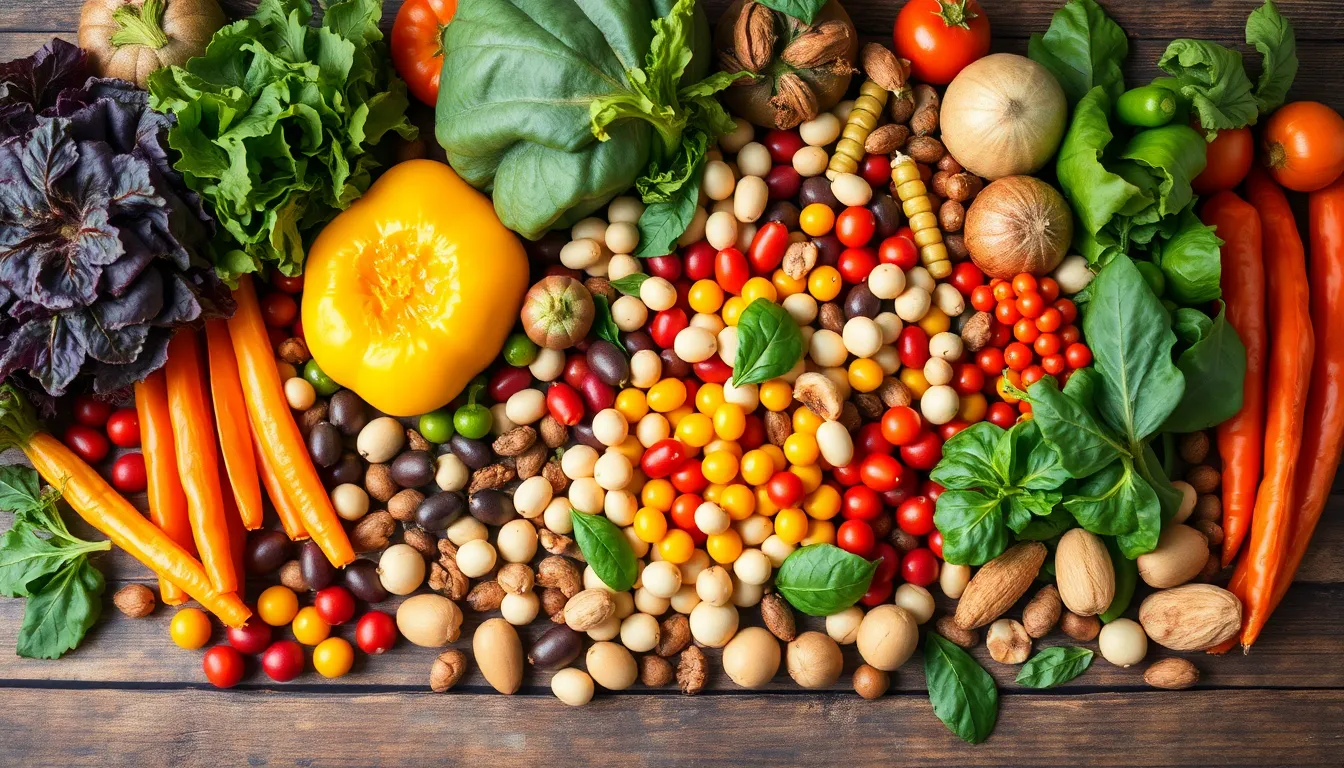Imagine a world where veggies aren’t just a sidekick to your steak but the star of the show. Vegetarian cuisine has evolved from bland salads and uninspired stir-fries into a vibrant tapestry of flavors that even the most devoted carnivores can’t resist. It’s not just about giving up meat; it’s about embracing a culinary adventure that celebrates nature’s bounty.
Table of Contents
ToggleOverview of Vegetarian Cuisine
Vegetarian cuisine encompasses a diverse range of dishes that use fruits, vegetables, grains, legumes, nuts, and seeds. It places a focus on enhancing flavors through various cooking techniques and spices. Many cultures integrate vegetarian meals into their culinary traditions, showcasing the versatility of plant-based foods.
This cuisine highlights the nutritional benefits of a plant-based lifestyle, including reduced health risks associated with chronic diseases. Incorporating a variety of colorful vegetables and whole grains promotes balanced nutrition and influences palatable experiences.
Numerous innovative recipes utilize meat alternatives, such as tofu, tempeh, and seitan, providing satisfying textures and flavors. Many chefs craft plant-based dishes that mimic traditional meat recipes, appealing to both vegetarians and meat-eaters alike. Popular dishes include hearty lentil soups, vibrant vegetable stir-fries, and flavorful chickpea curries.
Cuisines from around the world offer a plethora of vegetarian options. Indian cuisine features meals like paneer tikka masala and dal makhani, while Mediterranean cuisine presents colorful tabbouleh and flavorful moussaka. In Asian cuisine, dishes such as vegetable sushi and pad Thai utilize fresh ingredients for enticing flavor profiles.
Meatless meals encourage creativity in cooking. Chefs experiment with ingredients like jackfruit as a substitute for pulled pork or expand flavor horizons with various types of grains. Tapping into local, seasonal produce fosters connection to the community and sustainability.
Offering abundant choices, vegetarian cuisine invites everyone to explore and discover satisfying meals that celebrate the richness of plant-based foods. It creates opportunities for diners to enjoy unique flavors while embracing a healthy and ethical lifestyle.
Nutritional Benefits of Vegetarian Cuisine

Vegetarian cuisine offers a wealth of nutritional benefits that support a healthy lifestyle. A balanced vegetarian diet includes an array of essential nutrients.
Essential Nutrients in a Vegetarian Diet
Vegetarians can obtain protein from legumes, nuts, and seeds. Fiber-rich foods such as whole grains and vegetables play a crucial role in digestion. Iron sources include lentils, chickpeas, and fortified cereals. Calcium, vital for bone health, is abundant in leafy greens, almonds, and fortified plant-based milk. Vitamin B12, primarily found in animal products, can be obtained through supplements or fortified foods. Omega-3 fatty acids, essential for heart health, are found in flaxseeds, chia seeds, and walnuts. Each nutrient contributes to overall well-being when consumed appropriately.
Health Benefits of Going Vegetarian
Health benefits associated with vegetarianism are significant. Reduced risk of chronic diseases like heart disease and diabetes occurs among those who adopt a plant-based diet. Weight management often aligns with increased vegetable and fiber intake. Lower cholesterol levels contribute to improved cardiovascular health. Moreover, the anti-inflammatory properties of many plant foods promote better overall health. Research indicates improved energy levels and greater mental clarity in individuals following a vegetarian lifestyle. Each benefit underscores why many choose to embrace vegetarian cuisine.
Popular Vegetarian Dishes Around the World
Vegetarian cuisine features a rich array of dishes that showcase diverse flavors and ingredients across the globe. Exploring these culinary traditions reveals unique tastes and preparations.
Indian Vegetarian Cuisine
Indian vegetarian cuisine offers a vibrant selection of dishes. Heavily spiced lentil curries like dal are staples, providing protein and flavor. Palak paneer combines creamy spinach with Indian cheese for a nutritious option. Samosas serve as popular snacks, with savory fillings wrapped in crispy pastry. Various vegetable dishes like aloo gobi blend potatoes and cauliflower with aromatic spices. These dishes highlight the prominence of herbs and spices, creating unforgettable flavors.
Mediterranean Vegetarian Dishes
Mediterranean vegetarian dishes emphasize fresh ingredients and bold flavors. Greek salad features crisp vegetables, olives, and feta cheese, providing a refreshing side dish. Hummus, made from chickpeas, tahini, and olive oil, branches out as a versatile spread or dip. Ratatouille showcases seasonal vegetables, slow-cooked in a fragrant tomato sauce for depth. Falafel, a fried chickpea ball, serves as a satisfying protein source. These options reflect the Mediterranean diet’s focus on healthful, plant-based foods.
Cooking Techniques for Vegetarian Meals
Cooking techniques play a vital role in enhancing vegetarian meals. Various methods bring out flavors and textures in plant-based ingredients.
Grilling and Roasting
Grilling provides a distinct smoky flavor, perfect for vegetables like bell peppers, zucchini, and eggplant. Roasting vegetables caramelizes their natural sugars, intensifying taste. A combination of herbs and spices can elevate grilled and roasted dishes significantly. It’s common to experiment with marinades, infusing extra flavor into mushrooms, tofu, and tempeh. Utilizing a grill or oven with proper temperature control optimizes results. Many chefs recommend preheating the grill and roasting vegetables on parchment paper to prevent sticking. This technique works well for creating vibrant salads or hearty grain bowls.
Steaming and Sautéing
Steaming retains essential nutrients in vegetables while keeping their vibrant colors intact. Broccoli, carrots, and green beans benefit greatly from this method. Sautéing, on the other hand, combines quick cooking with flavor-building through the use of oils and seasonings. Garlic and onions often serve as foundational ingredients in sautéing, creating depth in various dishes. Blending steaming and sautéing can result in colorful stir-fries packed with flavor and nutrients. Chefs frequently recommend using fresh herbs and spices during sautéing for optimal taste. The right balance of these techniques helps create satisfying vegetarian meals that appeal to diverse palates.
Creating Balanced Vegetarian Meals
Creating balanced vegetarian meals involves thoughtful ingredient selection to ensure nutritional needs are met. Utilize a variety of vegetables, grains, and proteins from plant sources for diverse flavors and nutrients. Incorporating colorful produce not only enhances aesthetics but also boosts vitamin and mineral intake.
Protein-rich foods like legumes, quinoa, and tofu serve as foundation components. Lentils, black beans, and chickpeas contribute not only protein but also fiber, aiding in digestive health. Whole grains offer essential carbohydrates and energy; examples include brown rice, barley, and farro.
Calcium plays a vital role in bone health. Incorporating leafy greens such as kale, bok choy, and fortified plant-based milk delivers this nutrient. Iron-rich options like lentils and spinach help maintain healthy blood levels, especially for those avoiding meat.
Incorporating healthy fats can further enhance meals. Use ingredients like avocados, nuts, and seeds to provide omega-3 fatty acids. Flaxseeds and walnuts are excellent sources, contributing to overall well-being.
Experimenting with cooking methods can transform ingredients. Grilling vegetables adds a smoky flavor while roasting intensifies sweetness. Steaming and sautéing preserve nutrient density and freshness. Fresh herbs and spices elevate taste with minimal calories, encouraging a palette of robust flavors.
Combining diverse cuisines adds excitement to meal creation. Exploring Indian, Mediterranean, and Asian vegetarian dishes opens a world of flavors. Recipes like lentil curries and ratatouille highlight the versatility of vegetarian cooking. Engaging with local, seasonal produce ensures meals remain in harmony with the environment.
Crafting balanced vegetarian meals equips individuals with the ability to enjoy delicious, healthful food that satisfies a wide range of dietary needs while promoting an overall healthy lifestyle.
Vegetarian cuisine offers a vibrant and diverse world of flavors that can cater to all palates. It’s not just about forgoing meat but embracing a plethora of plant-based ingredients that nourish both body and soul. With the right techniques and a bit of creativity, anyone can transform simple vegetables and grains into mouthwatering dishes that rival traditional meals.
The health benefits associated with a vegetarian lifestyle are compelling, making it an appealing choice for many. By exploring global cuisines and seasonal produce, individuals can discover satisfying meals that promote well-being and ethical eating. Embracing vegetarian cuisine is a journey filled with delicious possibilities that enrich daily life.









